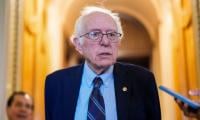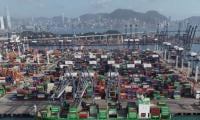‘Economic Reforms Act opens window for money laundering, tax evasion’
KARACHI: Imran Khan, Chairman, Pakistan Tehrik-e-Insaf (PTI) on Saturday said that Protection of Economic Reform Act, 1992 was framed to open window for money laundering and tax evasion.
In his address at the Karachi Chamber of Commerce and Industry (KCCI), he said: “Following the introduction of this act, the money was invested in offshore companies.” He said that the law also increased the incidences of corruption, which was deep rooted at present.
The PTI chief said that the business community is afraid of raising voice against government policies. “The business community is vulnerable against the power. They are afraid of notices from the Federal Board of Revenue (FBR) in case of raising voice against government policies,” Imran added.
The political leadership should focus on GDP growth and welfare of the people, the PTI chief said, adding that a businessman in power would only be a successful leader once he dedicates his efforts for the welfare of society.
Corruption has hampered investment in the country, he said, adding that the prime minister had recently visited many countries to attract investment into the country. Talking about lower revenue collection, he said, the people would only pay tax when they trust the leadership and governance. “If PTI comes into power, it will increase revenue and reduce tax rates,” he added. PTI’s senior leader and member parliament Asad Umar said that his party had opposed Gas Infrastructure Development Cess (GIDC).
He; however, said his party supported the recommendations of the Tax Reform Commission, which was constituted by Finance Minister Ishaq Dar.
“Surprisingly, those who constituted the TRC are not implementing the recommendations of this important commission,” he added. Talking about the reports on the proposed general amnesty, he said that introducing amnesty means state’s failure. He stressed upon improving FBR machinery.
Commenting on deteriorating textile industry, he said that it was due to high cost of doing business including high tariff for electricity and gas. He said that the business was subject to 87 percent indirect taxes.
Criticising the policies of the government, he said that economic growth had been compromised for the sake of FBR’s revenue collection. Pakistan Steel Mills remained closed for the last 18 months during the the present government’s tenure.
Earlier, Siraj Kassem Teli, chairman of the Businessmen Group, and former KCCI president, said that the general tax amnesty should only be introduced by imposing high tax rate for whitening black money and on condition that people parked money abroad should bring back to Pakistan. Shamim Firpo, president of the KCCI in his address of welcome said that Pakistan is the biggest producer of cotton, but its exports are deteriorating. Bangladesh, which does not produce cotton, has substantial export growth, he added.
-
 ‘Miracle On Ice’ Redux? US Men Chase First Olympic Hockey Gold In 46 Years Against Canada
‘Miracle On Ice’ Redux? US Men Chase First Olympic Hockey Gold In 46 Years Against Canada -
 Friedrich Merz Heads To China For High Stakes Talks In An Effort To Reset Strained Trade Relations
Friedrich Merz Heads To China For High Stakes Talks In An Effort To Reset Strained Trade Relations -
 Astronauts Face Life Threatening Risk On Boeing Starliner, NASA Says
Astronauts Face Life Threatening Risk On Boeing Starliner, NASA Says -
 Hailey Bieber Reveals How Having Ovarian Cysts Is 'never Fun'
Hailey Bieber Reveals How Having Ovarian Cysts Is 'never Fun' -
 Kayla Nicole Looks Back On Travis Kelce Split, Calls It ‘right Person, Wrong Time’
Kayla Nicole Looks Back On Travis Kelce Split, Calls It ‘right Person, Wrong Time’ -
 Prince William And Kate Middleton Extend Support Message After Curling Team Reaches Olympic Gold Final
Prince William And Kate Middleton Extend Support Message After Curling Team Reaches Olympic Gold Final -
 Nvidia CEO Praises Elon Musk, Calls Him An ‘extraordinary Engineer'
Nvidia CEO Praises Elon Musk, Calls Him An ‘extraordinary Engineer' -
 Shia LaBeouf's Mugshot Released After Mardi Gras Arrest On Battery Allegations In New Orleans
Shia LaBeouf's Mugshot Released After Mardi Gras Arrest On Battery Allegations In New Orleans -
 Timothee Chalamet Felt '17 Again' After Reunion With 'Interstellar' Director Christopher Nolan
Timothee Chalamet Felt '17 Again' After Reunion With 'Interstellar' Director Christopher Nolan -
 Conan O'Brien Speaks First Time After Rob Reiner's Killing
Conan O'Brien Speaks First Time After Rob Reiner's Killing -
 Giant Tortoise Reintroduced To Island After Almost 200 Years
Giant Tortoise Reintroduced To Island After Almost 200 Years -
 Eric Dane Drops Raw Confession For Rebecca Gayheart In Final Interview
Eric Dane Drops Raw Confession For Rebecca Gayheart In Final Interview -
 Trump Announces New 10% Global Tariff After Supreme Court Setback
Trump Announces New 10% Global Tariff After Supreme Court Setback -
 Influencer Dies Days After Plastic Surgery: Are Cosmetic Procedures Really Safe?
Influencer Dies Days After Plastic Surgery: Are Cosmetic Procedures Really Safe? -
 Eric Dane Confesses Heartbreaking Regret About Daughters' Weddings Before Death
Eric Dane Confesses Heartbreaking Regret About Daughters' Weddings Before Death -
 Nicole 'Snooki' Polizzi Reveals Stage 1 Cervical Cancer Diagnosis
Nicole 'Snooki' Polizzi Reveals Stage 1 Cervical Cancer Diagnosis



